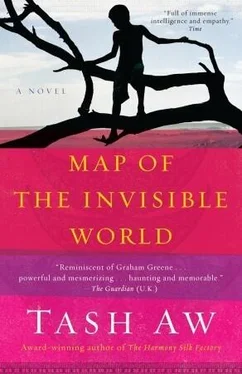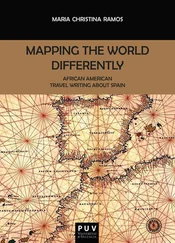Tash Aw - Map of the Invisible World
Здесь есть возможность читать онлайн «Tash Aw - Map of the Invisible World» — ознакомительный отрывок электронной книги совершенно бесплатно, а после прочтения отрывка купить полную версию. В некоторых случаях можно слушать аудио, скачать через торрент в формате fb2 и присутствует краткое содержание. Год выпуска: 2010, Издательство: Spiegel & Grau, Жанр: Современная проза, на английском языке. Описание произведения, (предисловие) а так же отзывы посетителей доступны на портале библиотеки ЛибКат.
- Название:Map of the Invisible World
- Автор:
- Издательство:Spiegel & Grau
- Жанр:
- Год:2010
- ISBN:нет данных
- Рейтинг книги:4 / 5. Голосов: 1
-
Избранное:Добавить в избранное
- Отзывы:
-
Ваша оценка:
- 80
- 1
- 2
- 3
- 4
- 5
Map of the Invisible World: краткое содержание, описание и аннотация
Предлагаем к чтению аннотацию, описание, краткое содержание или предисловие (зависит от того, что написал сам автор книги «Map of the Invisible World»). Если вы не нашли необходимую информацию о книге — напишите в комментариях, мы постараемся отыскать её.
comes an enthralling novel that evokes an exotic yet turbulent place and time—1960s Indonesia during President Sukarno’s drive to purge the country of its colonial past. A page-turning story,
follows the journeys of two brothers and an American woman who are indelibly marked by the past — and swept up in the tides of history.
Map of the Invisible World — читать онлайн ознакомительный отрывок
Ниже представлен текст книги, разбитый по страницам. Система сохранения места последней прочитанной страницы, позволяет с удобством читать онлайн бесплатно книгу «Map of the Invisible World», без необходимости каждый раз заново искать на чём Вы остановились. Поставьте закладку, и сможете в любой момент перейти на страницу, на которой закончили чтение.
Интервал:
Закладка:
“Well,” Margaret said, “why don’t you just go ahead and do it?”
Instantly Din fell pensive and silent, as he played with the pool of curry in which he had drowned his rice. “No one will fund me. I asked everyone in Holland and they all said no. They think it’s about politics. And here, well, the president talks about grand projects, but we all know there’s never going to be any money. Not for people like me.”
Margaret did not answer. She looked at his slim, sloping shoulders as he toyed aimlessly with his food. He had a way of making the morsels on his plate seem meager and almost inedible. There was nothing she could do for him, she thought; perhaps she ought to give up. Perhaps she ought to have given up on this country a long time ago. It was still early in the evening, but she was already tired.
“Let’s go for a drink,” she said. She would shake off this lethargy; she knew she could.
Din’s face twisted into a half frown. “Um, no thanks, actually. I’m quite tired today. Maybe I’ll just go home.”
Margaret stacked the empty dishes on top of each other, to signify the end of the meal. “Just come for one quick drink. You’ll enjoy it from an anthropological point of view if nothing else. Come on.” She waved a few bills at the vendor.
“Really, it’s very kind of you, but I don’t think I’d be comfortable at the Hotel Java.”
“Rubbish. You’ll have a ball. I told you, I never take no for an answer.” She smiled sweetly and knew that he would come: When she decided she wanted something, she was never refused.
As they got up to leave Margaret turned back to look one last time at the boy with the Berkeley T-shirt, but he was no longer at the table. She looked around at the stalls, expecting to see him half-hidden behind a pillar or milling in the crowds, but she could see nothing. He had been there at the table half a minute ago and now he was gone.
“Well, what fun this is going to be,” Margaret said brightly.
BUILT IN 1962 to celebrate the Asian Games, the Hotel Java sits on the edge of a sweeping roundabout in an area that might be called down town if this city had an uptown. Like so many of the brutalist concrete buildings springing up around Jakarta, the hotel’s angular lines and slightly industrial appearance were meant to remind the beholder of both Le Corbusier and the Bauhaus aesthetic: international yet functional. The roundabout in front of it is in fact a shallow, perfectly circular pool from which jets of water spurt majestically at a young peasant couple standing on a tall narrow plinth. The hotel and the fountain are just two of the many projects designed to impress visitors to Jakarta with the city’s dynamism, and were commissioned by Sukarno himself (the president’s majestic erections, Margaret called them). Not more than two years had passed and already the toilets in the hotel were unpleasant; some of the bulbs in the grand chandelier in the lobby had burned out and hadn’t been replaced; the carpets were scarred by cigarette burns and the table linen dyed with old wine stains.
“Looks as if the president’s erections are faltering,” Margaret said as she looked at the chipped edge of the bar. She had had two martinis already. The first had gone straight to her head and the second had slipped down all too easily. She was trying to make the third one last, but it was difficult; she felt a flush in her cheeks and she wanted to drink quickly. She was already quite light-headed, she knew, but she felt strong again.
Din stood with his elbows on the bar, facing away from the room. He stared at the rows of bottles arranged on the mirrored wall facing him, as if examining every single label. He would take only a Coke, no matter how hard Margaret tried to persuade him otherwise. He wouldn’t even drink a Bintang. She was usually sensitive enough not to transgress cultural boundaries — but Din was different. Yes, he was Muslim, but he had lived for three years in Europe and was not just another unsophisticated small-town Indonesian. If they both had a drink, she thought, the alcohol might help break down the boundaries that remained between them and they would be friends.
There was music, a band and a pretty Filipina in a tight white dress singing “Solamente Una Vez” in bright, clear notes, rolling her r ’s impeccably while shaking a pair of brightly colored maracas to accompany the Cuban drums. The bar was not full but it was already very noisy, the air smoky and filled with men’s voices. There were a lot of men here and not many women; not many locals either. The only Indonesians present seemed to be women, and nearly all were prostitutes.
“Here you have the Occident’s finest at play,” Margaret said. “See those two guys? Pulitzer winners a few years back. They’re supposed to be reporting on one of the most urgent political situations in the world and what do they do? Chase after girls they can’t get at home. And that idiot over there, yes, that one canoodling with the Batak girl, he’s meant to be administering aid for the World Bank, but it doesn’t look as if he’s capable of administering anything but a strawberry daiquiri.”
“Do you know everyone here?” Din asked.
“I recognize a few faces.”
A big pink-faced man with sandy hair and freckles came through the doors and headed straight for Margaret. He had a young local girl with him, tall for a Javanese and quite fair. “Margaret, how are you? Haven’t seen you in ages — not since last year’s Fourth of July party at the Lazarskys’. Who’s the boyfriend?”
“He’s not my boyfriend , he’s my colleague at the university.” She was about to introduce Din when she noticed he had slipped away, heading for the bathroom. “How’s the girlfriend , Bill?”
“Fine,” he said, putting a fleshy arm across his companion’s shoulders, “just fine. Her name’s Susanti, but I just call her Sue.”
“Been together long?”
“Guess so. Longest since I got here, at any rate.” He laughed, patting his pockets in search of his cigarettes.
“Wow. Two weeks? Congratulations.”
He smiled for a moment then broke into an overhearty laugh. “You just kill me. You’re still just so … Margaret.”
“See you around, Bill.”
A table and two chairs became free at the back of the room, in a shad owy corner where the lightbulbs had gone out. Margaret went over and sat down, making a cursory attempt to fiddle with the bulbs. She pre ferred everything to be bathed in light, preferably sunlight. It was not that she was afraid of the dark: She just did not like it, for it frustrated her not to be able to make things out clearly. The windows looked out onto narrow streets away from the noise and great rush of traffic of the grand roundabout. There were not so many people here, just a few of the embassy drivers waiting for their bosses to finish dinner. They milled about in small groups, smoking and exchanging gossip. Most of them were smartly dressed in creased trousers and khaki shirts, but there were a number of other locals who were more difficult to place: bodyguards trying to look casual, perhaps, or local journalists bribing the drivers for information. Margaret tried to discern the differences between them. She was good at this, good at spotting what lay behind this Asian mask of inscrutability. She had learned to do this in the jungle, with tribes who wore real masks and whose body language was indecipherable to outsiders, and she applied it with great success everywhere in Indonesia, even in this city of three million people. In America and Europe she had not been quite so successful; her antennae did not pick up the right signals with other Occidentals. She had not really even been able to understand her parents.
Читать дальшеИнтервал:
Закладка:
Похожие книги на «Map of the Invisible World»
Представляем Вашему вниманию похожие книги на «Map of the Invisible World» списком для выбора. Мы отобрали схожую по названию и смыслу литературу в надежде предоставить читателям больше вариантов отыскать новые, интересные, ещё непрочитанные произведения.
Обсуждение, отзывы о книге «Map of the Invisible World» и просто собственные мнения читателей. Оставьте ваши комментарии, напишите, что Вы думаете о произведении, его смысле или главных героях. Укажите что конкретно понравилось, а что нет, и почему Вы так считаете.












